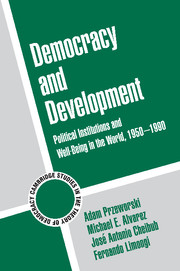Book contents
- Frontmatter
- Contents
- List of Tables and Figures
- Acknowledgments
- Introduction
- 1 Democracies and Dictatorships
- 2 Economic Development and Political Regimes
- 3 Political Regimes and Economic Growth
- 4 Political Instability and Economic Growth
- 5 Political Regimes and Population
- Conclusion
- Appendix I Selection Model
- Appendix II Codebook
- References
- Author Index
- Country Index
- Subject Index
Introduction
Published online by Cambridge University Press: 05 June 2012
- Frontmatter
- Contents
- List of Tables and Figures
- Acknowledgments
- Introduction
- 1 Democracies and Dictatorships
- 2 Economic Development and Political Regimes
- 3 Political Regimes and Economic Growth
- 4 Political Instability and Economic Growth
- 5 Political Regimes and Population
- Conclusion
- Appendix I Selection Model
- Appendix II Codebook
- References
- Author Index
- Country Index
- Subject Index
Summary
Questions
Is economic development conducive to political democracy? Does democracy foster or hinder material welfare? These have been central questions on intellectual and political agendas over the past fifty years, ever since the Atlantic Charter, signed by Churchill and Roosevelt in 1941, offered the “assurance that all men in all the lands might live out their lives in freedom from fear and want.” For the first time in history, democracy and development, freedom from fear and from want, were conceived as the future of all the people in the world, not as the privilege of the “civilized” nations.
In some ways, these questions are badly formulated. Political regimes, however one thinks about them, are complex. They combine many institutional features that can have emergent effects and that may work at cross-purposes. They may, at the same time, encourage economic rationality but hinder economic initiative, grant governments the authority necessary to promote development but also allow them to evade popular control, and foster long-term thinking at the cost of short-term disasters, or vice versa. Development, in turn, is a multifaceted process of structural transformations, not only economic, that becomes manifest in the growth of income, productivity, consumption, investment, education, life expectancy, and employment – all that makes for a better life. But again, these good things do not necessarily go together, and they certainly do not go together for all.
- Type
- Chapter
- Information
- Democracy and DevelopmentPolitical Institutions and Well-Being in the World, 1950–1990, pp. 1 - 12Publisher: Cambridge University PressPrint publication year: 2000
- 1
- Cited by



